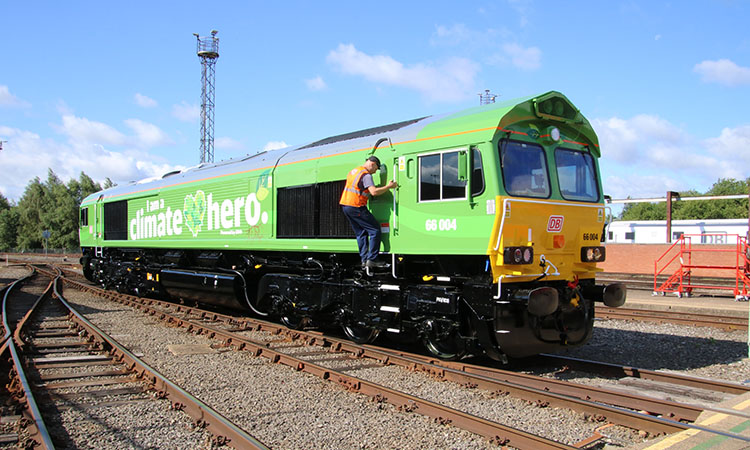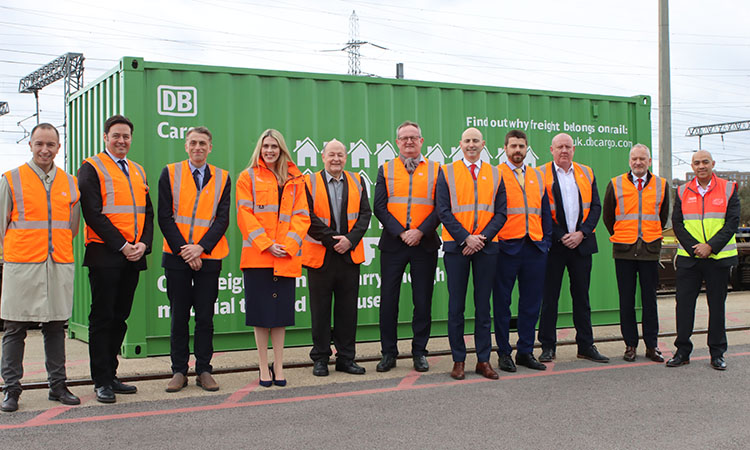Supporting the transition of freight from road to rail in the UK
Posted: 25 May 2022 | Kathryn Oldale | No comments yet
Kathryn Oldale, Head of Strategy, Policy and Communications at DB Cargo (UK) Limited, details the ways that the organisation has been encouraging businesses to increase the volume of rail freight in the UK, particularly through the Channel Tunnel.


Since the launch of the ‘Freight Belongs on Rail’ campaign in October 2021, DB Cargo UK has been pushing the benefits of modal shift from road to rail in the UK and trying to encourage other businesses to follow our lead with this mantra. With the average train carrying the equivalent of 76 HGVs and generating around 75 per cent less harmful carbon emissions, it is no wonder that this campaign has extended to international freight, due to its many benefits for businesses and the environment.
During a recent International Freight Belongs on Rail conference, hosted by DB Cargo UK, and attended by senior representatives from the Department for Transport (DfT), the Department for International Trade (DIT), the Great British Railways Transition Team (GBRTT), Eurotunnel, DB Cargo UK’s sister company Transfesa, and other major names from the supermarket, retail and automotive sectors, the barriers and opportunities to increase the volume of rail freight going through the Channel Tunnel were discussed in detail.


During a recent International Freight Belongs on Rail conference, the barriers and opportunities to increase the volume of rail freight going through the Channel Tunnel were discussed.
“Growing our international traffic and developing new European corridors are key strategic objectives for DB Cargo and there is no better time to drive forward discussions on what needs to change to achieve this,” Andrea Rossi, CEO of DB Cargo UK, said.
Since the launch of the ‘Freight Belongs on Rail’ campaign in October 2021, DB Cargo UK has been pushing the benefits of modal shift from road to rail in the UK and trying to encourage other businesses to follow our lead with this mantra.
Toyota are just one of the latest companies to commit to more international freight on rail, with their services from Toton in Nottinghamshire to Valenciennes in Northern France. Fully loaded trains carrying approximately 260 vehicles are now operating twice a week between the two locations; a movement that used to take five days by road, now takes just 24-hours by train and reduces their carbon emissions by 2,300 tonnes every year.
To make this project possible, DB Cargo UK and Groupe CAT worked together to create a new £2.6 million automotive transfer facility, and breathed life back into a previously disused area of the Toton site.
“The collaboration between DB Cargo UK, Groupe CAT and Toyota is a win-win-win for those involved and will see us deliver an efficient and environmentally friendly rail logistics solution for one of the world’s biggest automotive manufacturers,” Roger Neary, Chief Sales Officer for DB Cargo UK, commented.
“Without this investment and innovation, it would not have been possible to deliver the targeted environmental and lead-time benefits,” Steve Reynolds, Managing Director of Groupe CAT’s subsidiary STVA UK, added. “We should also publicly recognise the excellent support and contribution to this project from Eurotunnel, Border Force and the DfT, who have all really worked hard to make this project happen.”
Securing project funding
Recently, DB Cargo UK successfully bid for funding to create a new ‘Customs Approval Area’ at its intermodal terminal at Barking in London.
Leveraging a greater utilisation of the capacity through the Channel Tunnel would provide significant economic and environmental benefits compared with road or short sea shipping.
Thanks to a £470,000 award from the government’s multi-million-pound Port Infrastructure Fund, work is shortly due to begin on building a new inland border control facility to speed up the seamless movement of goods into and out of the country at the site, following the end of the Brexit transition period.
The investment will fund the construction of a new warehouse, where Border Control staff will be able to conduct inspections and where containers can be loaded and unloaded for onward travel. It will also include a new secure storage area to hold any confiscated/seized goods, additional site security and office and welfare facilities for HMRC staff.
Investing in Barking
Barking is already a key staging post between the UK and Europe and plays an important role in the import and export of materials, consumer goods and produce for use both home and abroad. Every week trainloads of refrigerated containers from Spain pass through the terminal en-route to supermarket shelves up and down the country. This latest investment will ensure Barking continues to play a significant role in the seamless transportation of goods to and from Europe.
Overcoming barriers and discussing opportunities
During the meeting, the barriers and opportunities to increase the volume of rail freight going through the Channel Tunnel were discussed, which is particularly relevant given the huge problems currently being experienced at some of the UK’s ports. Leveraging a greater utilisation of the capacity through the Channel Tunnel would provide significant economic and environmental benefits compared with road or short sea shipping. There is a huge appetite to grow the volumes of international rail freight and we are proud to be spearheading a campaign to drive this growth for UK PLC.
Whilst the delegates on the day all represented differing corners of industry and stakeholder groups, we all agreed on one thing, that International Freight Belongs on Rail.


Kathryn Oldale joined DB Cargo UK in March 2016 and is currently Head of Strategy, Policy and Communications. Prior to this, she worked for the commercial arm of health giant Johnson & Johnson, identifying strategic opportunities for growth and co-ordinating the company’s bid activities. Kathryn is a highly regarded member of DB’s senior management team and has recently led the company’s planning and response to such high-profile issues as the Williams Review, Brexit and most recently the coronavirus pandemic. As well as keeping the company’s 2,300 employees informed and engaged on a day-to-day basis, she also has responsibility for managing and developing the company’s strategic relationships with key stakeholders, policy makers and politicians.
Related topics
Cargo, Freight & Heavy-Haul, Operational Performance, Route Development, Sustainability/Decarbonisation
Related organisations
Border Force, DB Cargo UK, Department for International Trade (DIT), Department for Transport (DfT), Eurotunnel, Great British Railways Transition Team (GBRTT), Groupe CAT, STVA UK, Toyota, Transfesa







